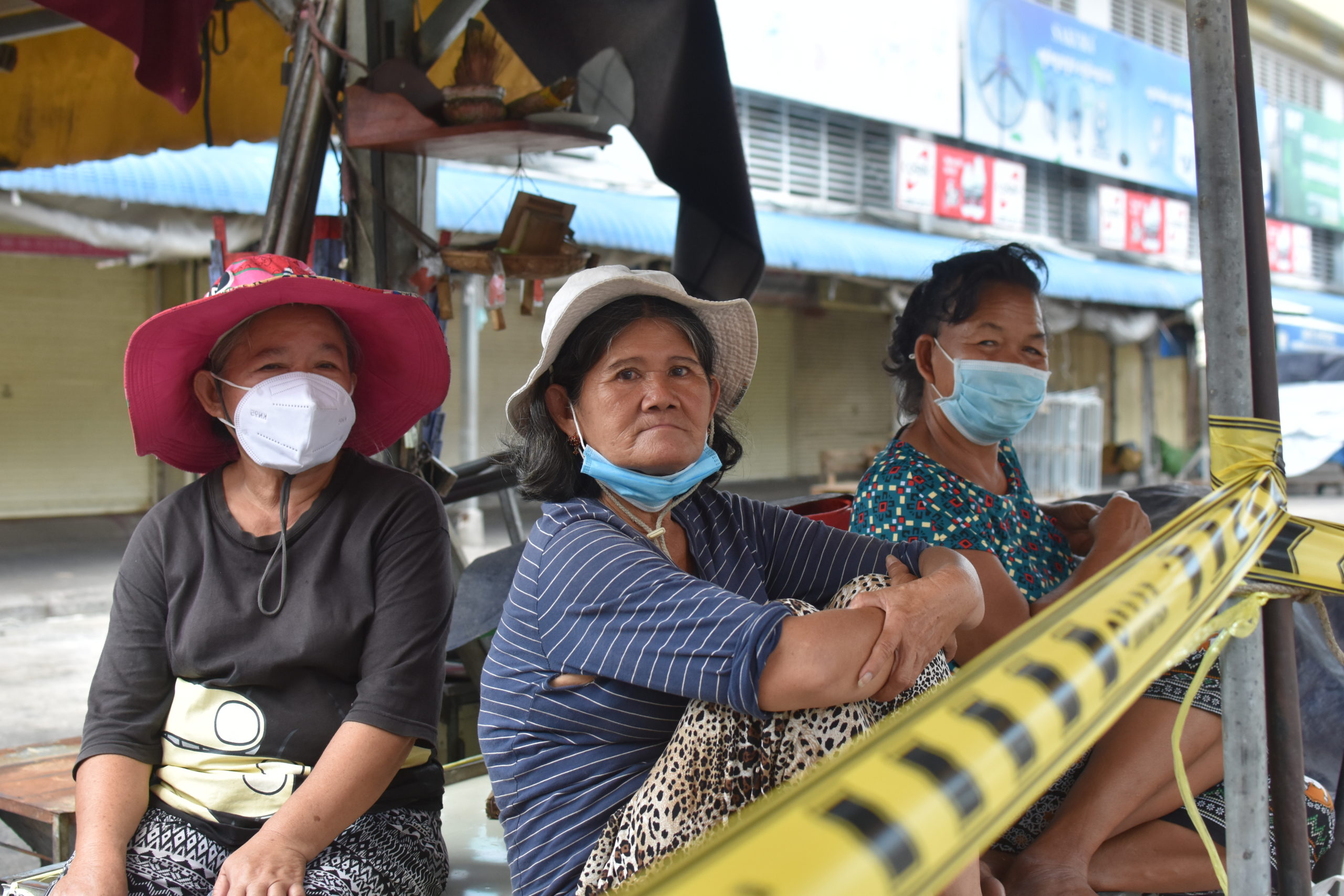Additional reporting and photography by Alastair McCready
For weeks now, the world of Phnom Penh moto-taxi driver Tim Tin has steadily folded into itself, shrinking a little more each day before squeezing finally into his family’s one-room apartment in the capital’s Meanchey district.
First went his work, with his last passenger hopping off on April 6. His wife, Nin Sok, followed suit just a few days later. She’d been working at the Din Han Garment factory, the site of a cluster of Covid-19 infections, and tested positive for the virus on April 9 along with more than 250 of her coworkers. Health authorities took the nearly asymptomatic Nin Sok for quarantine in a converted wedding hall on Koh Pich and, as of now, 38-year-old Tin has no idea when she might return to him and their two children.
Tin isn’t necessarily desperate yet, and he says the mood in his family’s rented 4×4 metre room is mostly one of boredom. But as the weeks drag on with neither paycheque nor promised aid from the government, he’s not sure how much longer his family can hold out.
“I hope everything will be back to normal soon, so that everyone can go out to make a living,” Tin told the Globe. “If it keeps on being like this, those who are poor won’t survive any longer, unless there is assistance from the authorities, because we lack both food and money.”
The motodop and his children, ages nine and 15 years, now pass the hours waiting out the capital’s strictest lockdown measures in their room in a warehouse-turned-living space in Stung Meanchey commune, one of seven areas designated by health authorities as “red zones” due to high rates of Covid-19.
Though life is especially hard in the zones, stories like Tin’s are now commonplace throughout the capital, where the fight to contain a rising tide of Covid-19 infections has led residents to weather restrictions on public life as a result of a hastily announced April 15 lockdown, cutting travel between city districts and shuttering nonessential businesses.
The streets of Phnom Penh, usually abuzz, have fallen into an uneasy silence. The city’s open-air markets, the main source of food for most, were ordered shut on April 24 as infections bloomed. So too were the garment factories, a critical pillar of the Cambodian economy, the week prior as part of the lockdown after Din Han and other producers hosted clusters of their own.
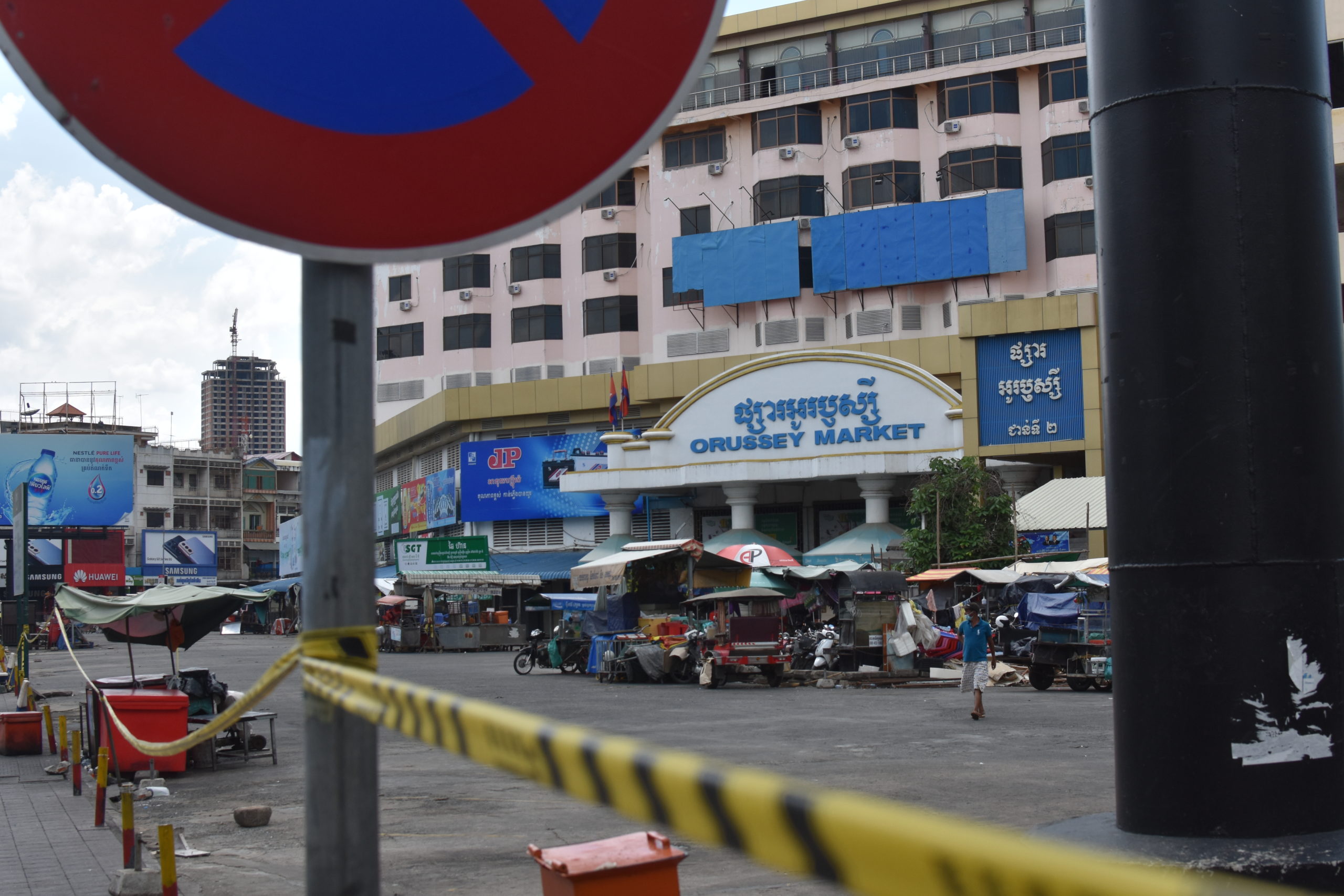
It’s hard to say what full effects the social shutdown will bring, as Cambodia weighs an economic blow against the massive human cost of a national outbreak. Though some civil society groups have been scraping testimony and pleas for help from hungry people on Facebook pages and Telegram channels, much is still unclear about service provision, or lack thereof, in the red zones and beyond.
What’s obvious is that the measures come at a time when many are already vulnerable, a year into a pandemic that has plunged the Cambodian economy into the red after a two decade-long run of strong growth. With personal savings stretched thin, next to no social safety net, and a labour-intensive economy, the crisis has come home for families like Tin’s. For them, it’s landing squarely on the dinner plate.
The state response to aid these families now deprived of all income has been patchy and sporadic. An initial aid package that included rice, noodles, canned fish and roughly $75 cash was quickly amended to cut the monetary portion. Subsequent packages have been distributed in much-photographed public ceremonies, some of which in the red zones drew tightly packed crowds of people – and also social media ire at the lack of distancing therein.
But as time went on, Tin’s family hadn’t received anything from the state. So he turned to the internet to see if someone there was listening.
“I decided to post asking for help on Facebook on April 18 and people started to spread it,” he said, talking to the Globe by phone from his room. “I got a small amount of money and some canned foods from people.”
He’d heard that households in other red zones had received some rations. But as far as he knows, nobody around him has gotten anything other than whatever they’ve stockpiled or received as donations from private citizens.
“I don’t know exactly what their living condition is like as I don’t dare to walk to their room,” Tin said, though he guessed food shortages were common in the 10 small rooms that made up his building. “I am pretty sure that they face the same problems as I am.”
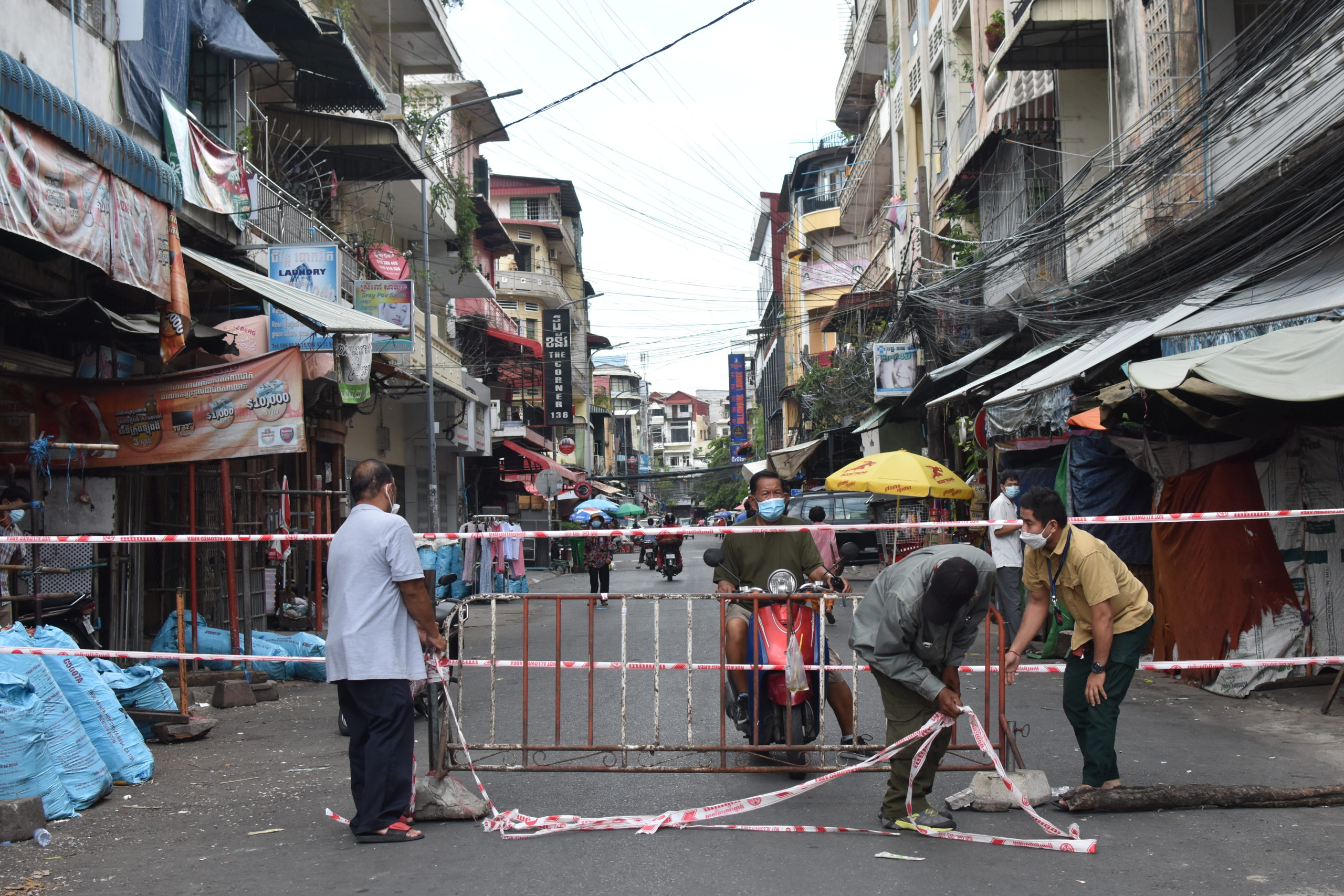
Thanks to a combination of factors, Cambodia during the pandemic had avoided any major outbreak of illness caused by the novel coronavirus. That streak lasted until February 20, when a group of newly arrived visitors infected with the virus escaped from a government quarantine after bribing a guard.
Before the so-called “February 20th event”, the Kingdom’s health authorities had officially counted 484 cases of Covid-19, with no recorded deaths. Since that date, the infection count has ballooned to just under 10,000 and claimed the lives of at least 74.
The capital’s red zones now include the entirety of the Meanchey district in southwest Phnom Penh, as well as communes in the western Pursencheay and Toul Kork district – areas that contain many of the country’s garment factories.
In the wake of the outbreak at Din Han in early April, which increased scrutiny of closely packed factories, all garment producers in Phnom Penh and neighbouring city of Takhmao were suspended as part of the lockdown’s closure of nonessential business.
The Ministry of Labour has stated there are about 500 factories employing 500,000 people at locations within the capital metro. Many have reported in the weeks since the lockdown that they haven’t received any money this month for their work before the closure.
That includes Va Mach, a coworker of the quarantined Nin Sok from the Din Han factory. Mach, 33, lives in the Chaom Chau 1 commune of Porsenchey district. While she didn’t test positive for Covid-19 like some of her fellow workers, she still found herself first in quarantine, then in the red zone. She’s now staying with her sister and brother in law, sharing a rented room in a borey.
Mach told the Globe that she didn’t have a chance to buy food while doing so was still easy. She’d had some canned food going into the 14-day quarantine, which started April 7, but that was quickly eaten. As with Tin, she’d had luck posting online asking for help, getting aid from both private citizens and also authorities of Porsenchey district.
Mach said the help from the district included “one sack of rice, 25kg, a box of noodles, a box of bottled water, fish sauce and soy sauce”.
She hasn’t been paid since March, but didn’t question the lack of cash in the aid package.
“I didn’t dare to ask why there is no money, I just accepted whatever they give us,” she said. For now, she’s living mostly on noodles and eggs, waiting for whatever might come next and grateful for the donations she’s received.
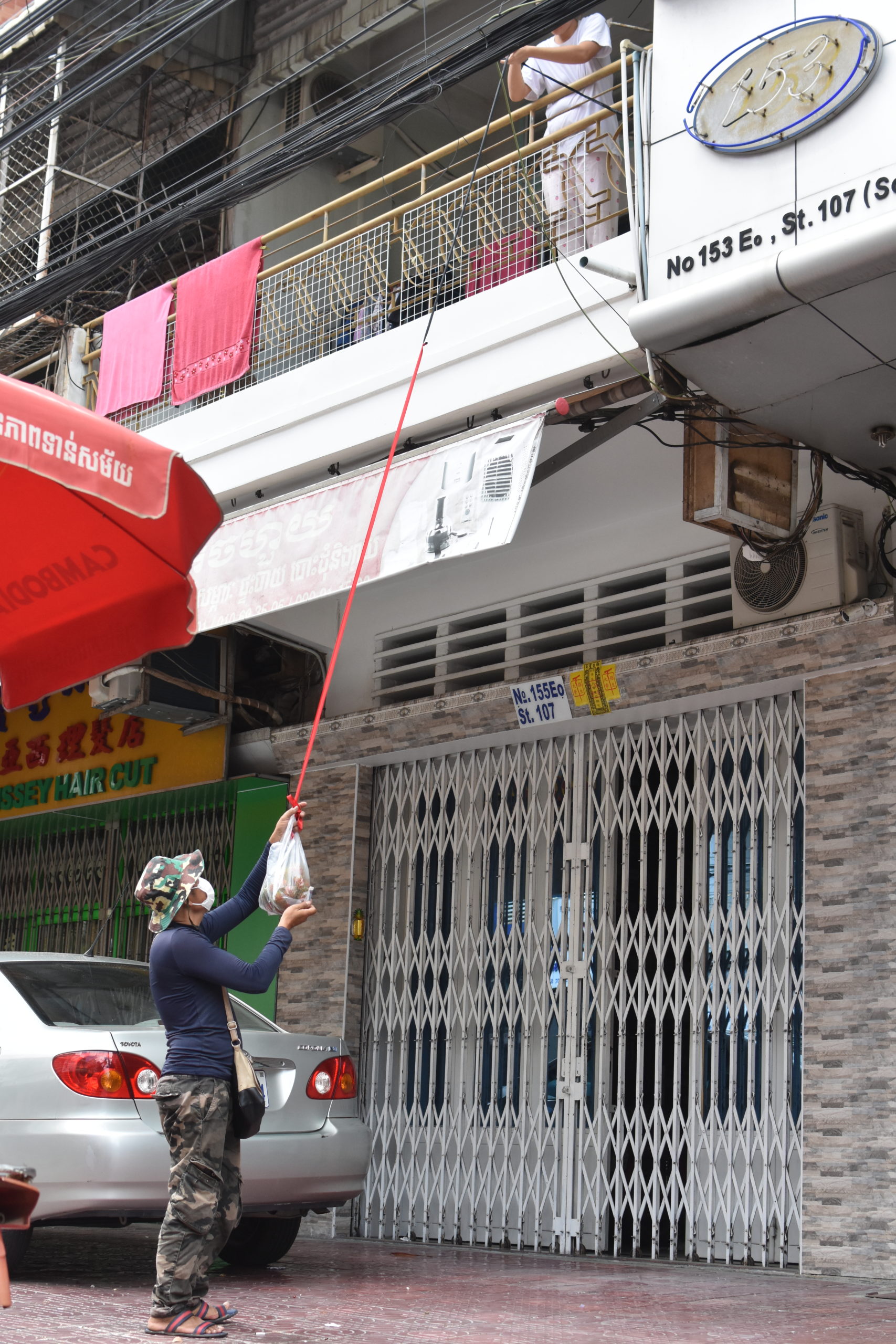
The items were not like what the Prime Minister said, so we refused to take it. There was no $75 [300,000 riel], no canned fish. Just rice, noodle, fish sauce and soy sauce
Fellow garment worker Ry Sreymao was also working at Din Han, the site of the cluster of infections, and faced similar issues as Mach in getting access to food.
“There was no assistance available until I posted on Facebook, asking for help,” she told the Globe.
Eventually, representatives of her commune did bring some food aid. But when it arrived, Sreymao said, there was a problem. Much like Mach had found, the aid package wasn’t what was initially described. However, Sreymao took a different course of action than her former coworker.
“The items were not like what the Prime Minister said, so we refused to take it,” she explained. “There was no $75 [300,000 riel], no canned fish. Just rice, noodle, fish sauce and soy sauce.”
“We refused because we have been under lockdown for a long time and we don’t have enough money for food,” she said. “Also, the garment factory hasn’t given us our salary yet ever since the lockdown.”
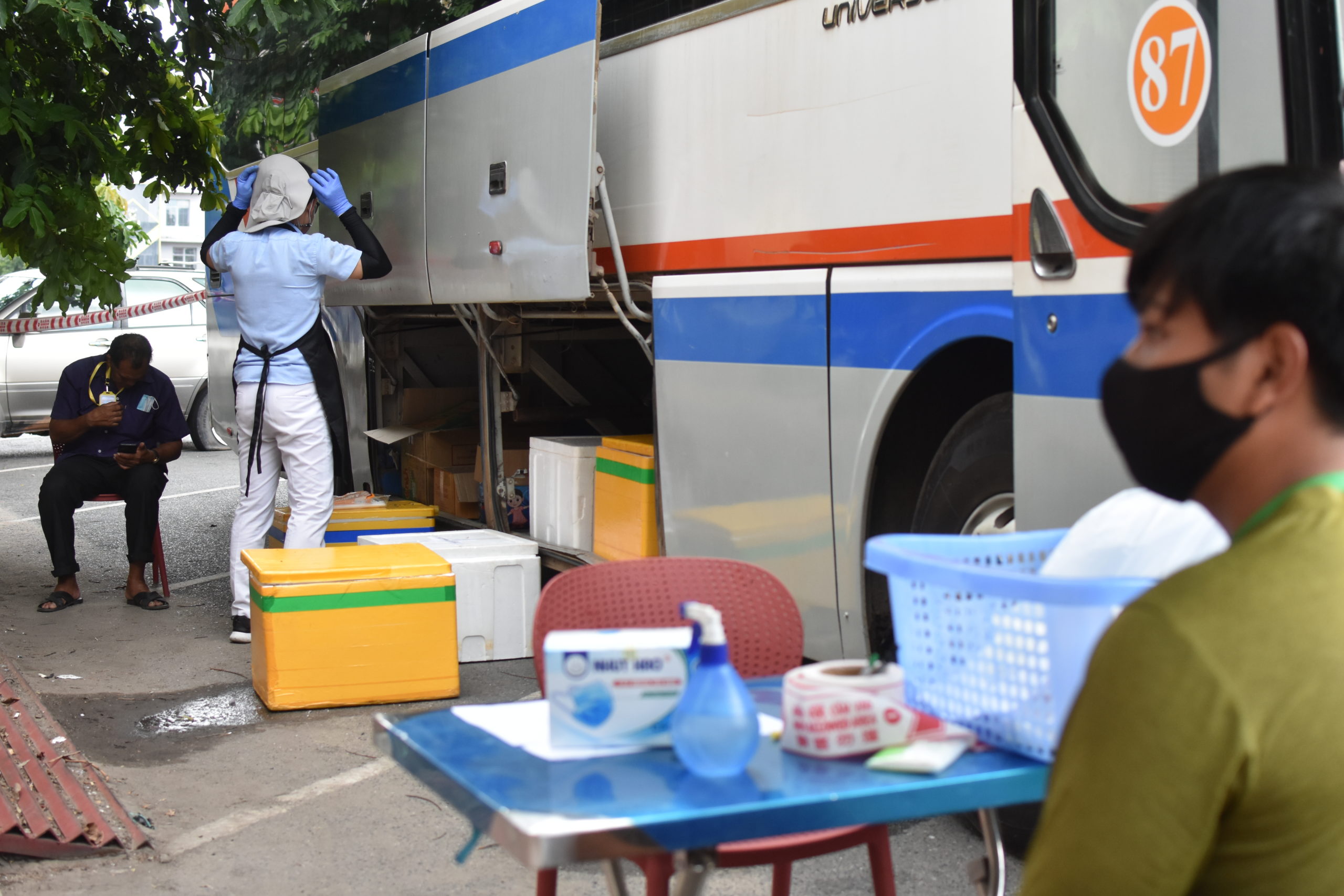
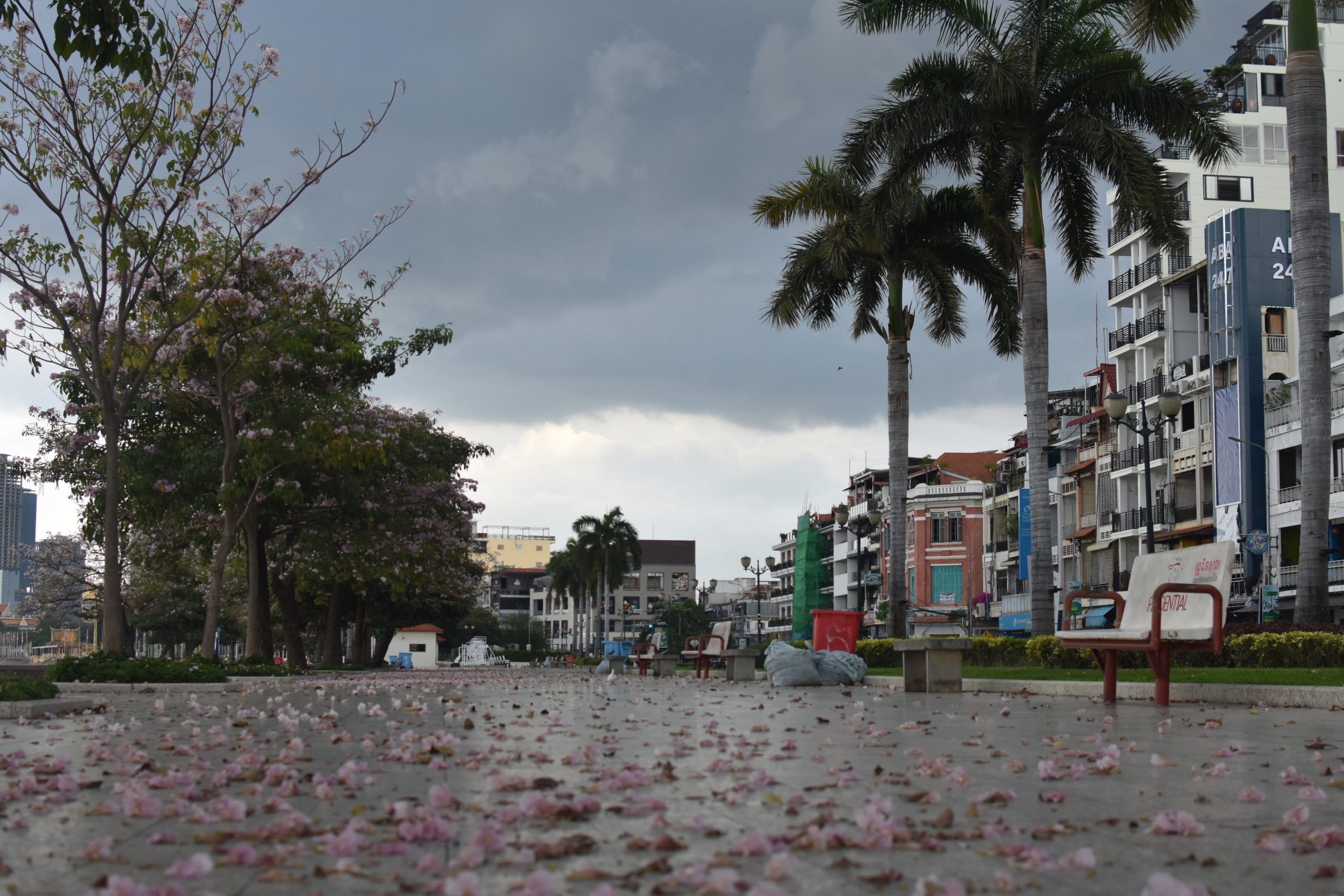
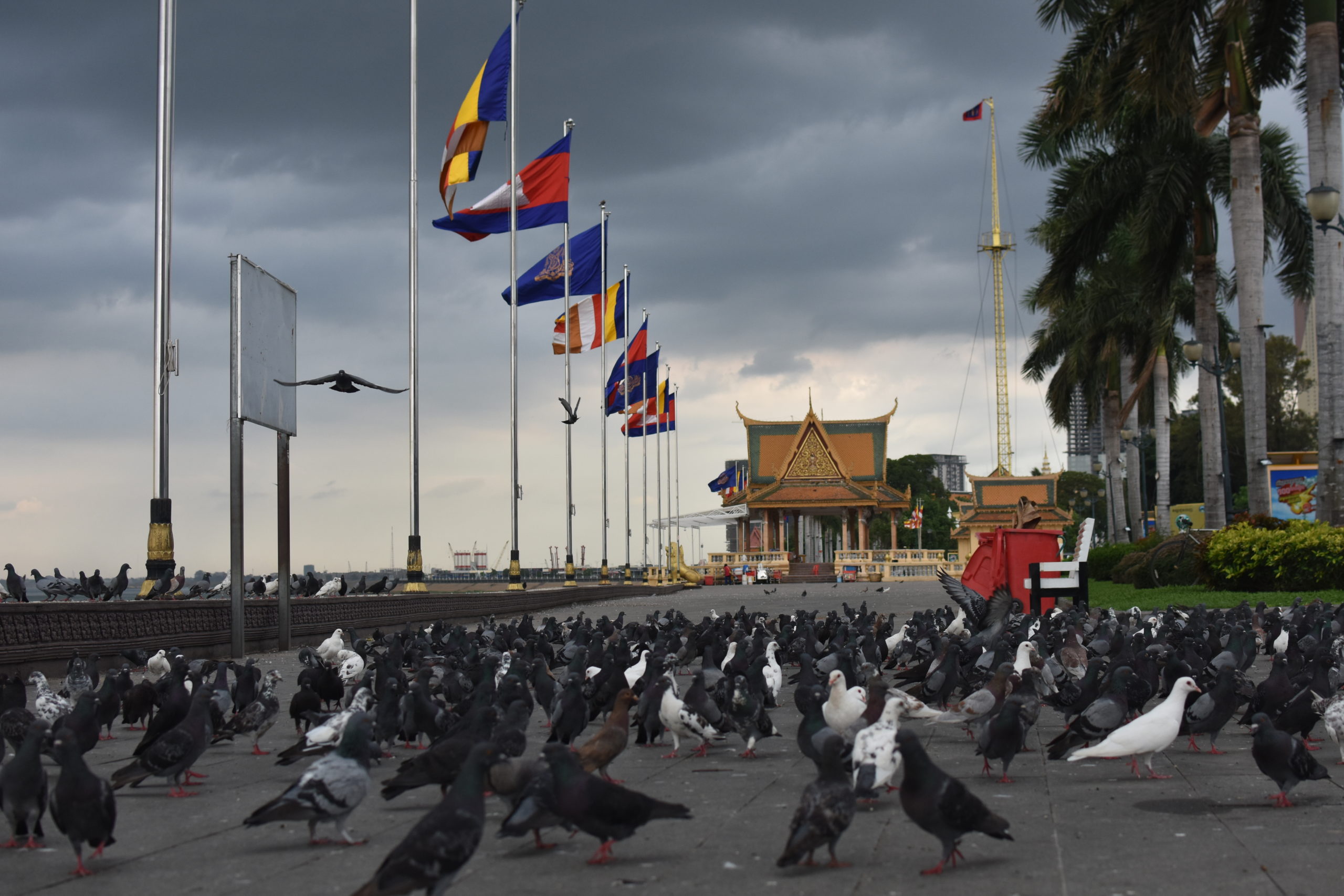
So far, besides the heavy presence of security forces manning barricades throughout the metro, much of the lockdown effort has been channeled through the Ministry of Commerce, as well as the influential Ministry of Economics and Finance. Aun Pornmoniroth, the head of that latter ministry, has been tapped to lead the lockdown committee steering such vital work as the delivery of food into the cordoned red zones, where local vendors have largely been forbidden to go.
Though some still manage, other neighbourhood shops have been displaced by government-run trucks or stalls peddling only the most basic staples, including brands owned by businesses well-connected to the state.
Even with state-provided food aid or subsidised sales of goods such as rice, private donations seem poised to continue filling gaps and empty stomachs. For those like Mach, the indefinite timeline of lockdown is already wearing thin.
“It’s definitely not easy. I’m stressed out, especially with the fact that there is not enough food,” Mach said.
“I want things to be back to normal as soon as possible, say at the end of this month. If it continues to be like that, it’s going to be very hard for me, especially regarding food,” he said.
“I heard there has been an increase in price for meat and vegetables as well, so even if I can go to the market after my quarantine, I don’t think I can afford it.”
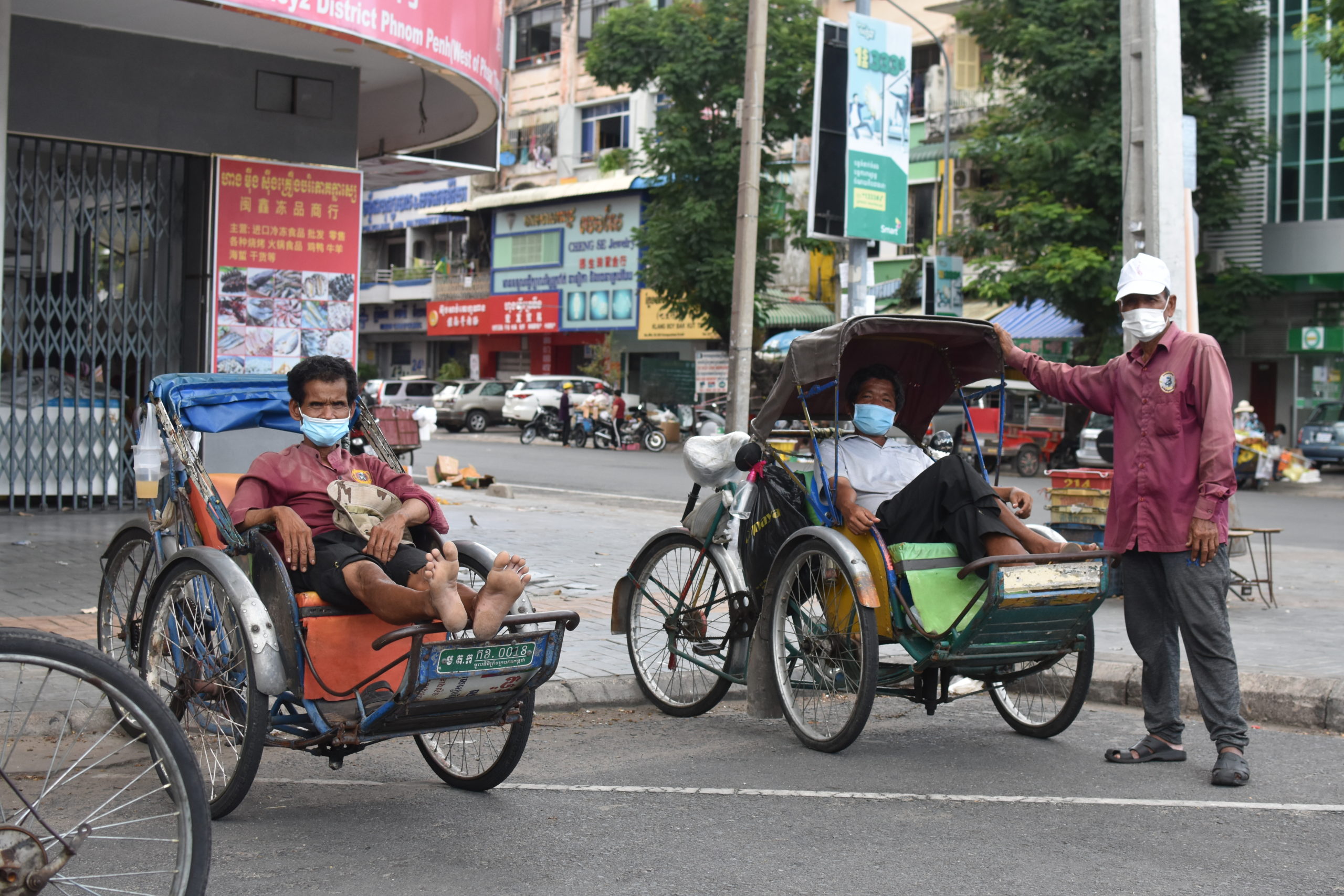
Even for those not trapped in a kafkaesque reality of the city’s red zones, their day-to-day is perhaps less restricted, but no less daunting.
Prior to the city-wide lockdown, Hoan would convene each day with a small group of regulars – moto-taxi, remorque and tuk-tuk drivers – chatting in between jobs on the shaded corner of Street 21 in Phnom Penh’s Tonle Bassac district.
Now the 50-year-old moto-taxi driver of ten years sits alone, perched on his ageing Daelim scooter, one of the last men standing in an industry decimated by a lack of customers on the capital’s streets.
“The other moto drivers, they have gone to their family’s homes in the province. But now, as everything is closed, they cannot come to work,” he said through a translator. “Only I didn’t go to the province.”
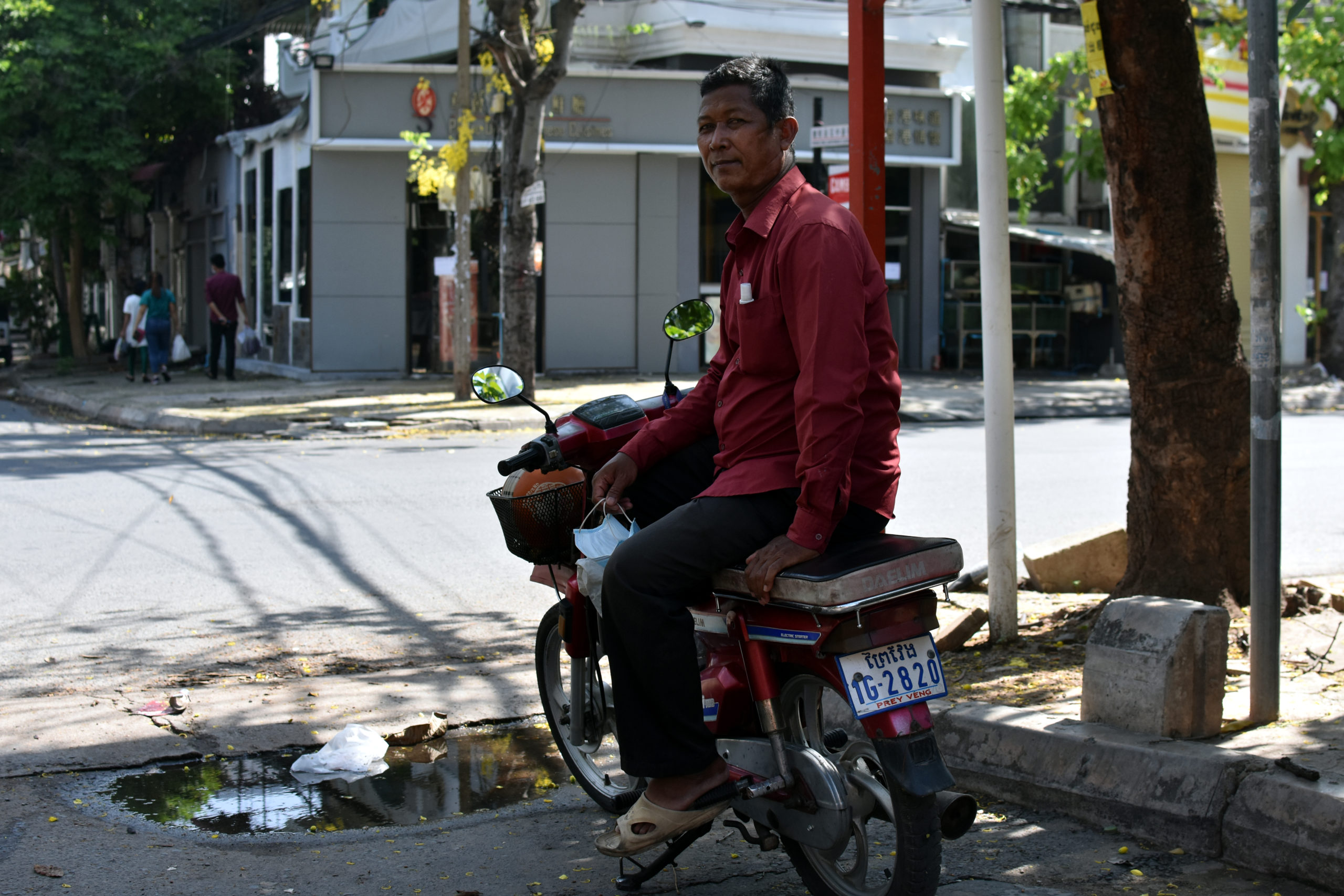
From Prey Veng, some 60km southeast of this spot, Hoan now navigates a city carved up by neighbourhood, cordoned-off with tape, with the residents of each Khan in theory segregated from one another unless crossing the divide for an essential reason.
For Hoan, despite needing to navigate a city of checkpoints, the economic necessity for returning to this familiar street corner is too great to ignore with a wife, two adult children and grandchildren to support on his wages alone.
“This has very badly impacted my family because I cannot earn money. Before I could get 50,000 riel [$12.50] a day, now I can only earn 10,000 riel [$2.50],” he said.
“I cannot support myself on this. I’m having to buy less food.”
